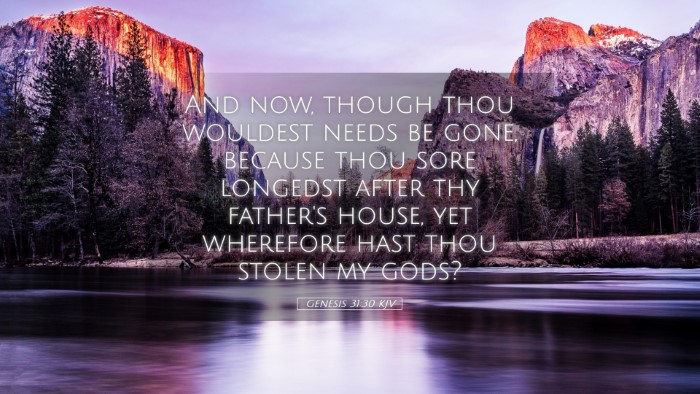Commentary on Genesis 31:30
Verse: "And now, though thou wouldest needs be gone, because thou sore longedst after thy father’s house, yet wherefore hast thou stolen my gods?" (Genesis 31:30)
Introduction
This verse occurs at a pivotal moment in the narrative where Jacob, having lived under Laban’s authority for many years, decides to leave with his family and flocks. The context is rich with familial tension, duplicity, and the desire for freedom, setting the stage for Laban's confrontation with Jacob. This commentary synthesizes insights from various public domain sources to explore the deeper theological and practical implications of this text.
Contextual Background
The preceding chapters illustrate the complex relationship between Laban and Jacob. Jacob, who sought refuge with Laban, ultimately grew prosperous, leading to tension marked by Laban’s envy. Jacob’s departure signifies not only a desire for autonomy but also a reclamation of his identity as the chosen patriarch of God's covenant people.
Matthew Henry's Perspective
Matthew Henry emphasizes the emotional depth of Laban’s accusation against Jacob regarding the theft of his gods. He articulates the irony in Laban’s concern for these household idols, which, rather than providing divine assistance, signify Laban's spiritual blindness. Henry notes:
- "Laban’s loss of these gods does not express his concern for their value but rather a fear of losing his power and influence."
- "Idols are without power and not worthy of concern; Jacob’s verification of their non-existence reveals Laban’s folly."
Albert Barnes' Insights
Albert Barnes brings attention to the cultural implications of Laban's idols, also known as teraphim. He explains their significance in Mesopotamian culture as symbols of personal lineage and familial prosperity. Barnes observes:
- "These idols represented not just Laban’s personal gods, but the preservation of his family's honor and legacy."
- "Jacob’s stealth in taking away his daughters and their possessions can be viewed not merely as betrayal but as a reclamation of rightful heritage."
Adam Clarke's Analysis
Adam Clarke presents a theological angle on the narrative. He highlights the stark contrast between Jacob’s faith and Laban’s idolatry. Clarke states:
- "The confrontation illustrates the dichotomy between a servant of the true God and a man entrenched in superstition and idolatry."
- "Jacob's rise from Laban’s shadow reveals God’s providence in guiding His people out of bondage to a false sense of security."
Theological Implications
This verse opens a window to profound theological themes that resonate throughout Scripture:
- The Nature of Idolatry: The accusation of theft emphasizes the futility of worshiping false gods. Idolatry often reflects a deep-seated insecurity about divine provision.
- God's Providence: Jacob's journey serves as a testament to God’s faithfulness in fulfilling His promises, leading Jacob away from a flawed system toward His divine promise.
- Family Dynamics: The narrative highlights the struggles within familial relationships, emphasizing the challenges faced by those who seek to adhere to God’s calling amidst familial loyalty.
Practical Applications
For pastors, students, and theologians, Genesis 31:30 offers rich avenues for application:
- Spiritual Assessment: The examination of personal idols in our lives is crucial. What do we hold onto that detracts from our relationship with God?
- Encouragement in Transition: Jacob’s journey illustrates that leaving behind past influences may be necessary for spiritual growth and fulfillment of God’s purpose.
- Outreach to the Unspiritual: The contrast between Jacob and Laban provides a template for engaging with those who prioritize worldly values over spiritual truth.
Conclusion
In Genesis 31:30, we witness not merely a confrontation between two men but a profound discourse on faith versus falsehood. The juxtaposition of Jacob’s faith journey against Laban’s idolatry serves to remind us of God’s active role in our lives, inviting us to reflect on the idols we must forsake and the pathways we are called to follow in pursuit of a deeper relationship with Him.


